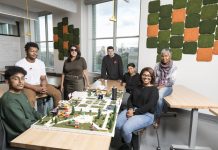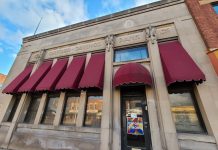Most accounting rulebooks define “the bottom line” as a company’s net earnings. But back in 1994, the British author and entrepreneurship expert, John Elkington, put forth a different framework for assessing value.
He termed itÃ˝‚Äútriple bottom line.‚Äù
Elkington believed that net earnings should be determined by three metrics: financial, social, and environmental. The total value of any business then, was not only its monetary worth, but also its social and environmental merit. In Detroit, an organization known as FoodLab, is helping to build a community of food-focused, triple-bottom-line businesses. Here are three standouts, serving fair, sustainable, and profitable food right at home.

Gabriel Hall
Part Creole-Cajun restaurant, part bar, part music venue, part museum, Gabriel Hall seems to be doing it all — and sustainably, too. Owners Ederique Goudia and Dameon Gabriel are still in the process of launching their first brick-and mortar location, but they’ve already made a pledge to doing so as ethically as possible. That means composting, sourcing from urban farmers of color, and paying livable wages. The latter goal required a complete overhaul of their business plan. “Instead of it being a full-service restaurant, we changed to a counter service model,” Goudia says. “That allowed us to have fewer employees on the floor but pay them actual livable wages.”
When asked what the most rewarding aspect of building this business has been, Goudia points to the famers. “It’s been the relationships we’ve built with them. We’re so proud to offer these healthy, locally grown ingredients, and really start telling their story.”
Gabriel Hall, .

Detroit Sip
“Where community and coffee jive.” That’s how owner Jevona Fudge describes her coffee shop, Detroit Sip. The full-time attorney officially opened the space in November 2017, but she claims that its story began long before. “I went to Michigan State for both undergrad and law school and I would study in Starbucks from open to close. It was really the first time I had experienced the comfort of a coffee shop.” After law school, Fudge, now 41, returned to Detroit with the dream of one day opening her own. In 2014, she was gifted a large space in Bagley and began renting it out for public and private events, sans coffee. But it became such a popular gathering spot that Fudge decided to follow her dream and eventually turned the space into a coffee shop. Since opening, she has petitioned the city government to install decorative garbage cans on the sidewalks nearby in order to make the area more walkable. She also plans to put her coffee grounds to creative use: donating them to people and companies that make soap, fertilizer, and even artwork. In the coming years, Fudge hopes to see Detroit Sip grow into an emblem of her city.
Detroit Sip, 7420 W. McNichols Rd., Detroit; 313-635-5130; .

Baobab Fare
By the time Burundi natives, Nadia Nijimbere and Hamissi Mamba, settled in Detroit in 2015, they had already spent four years seeking asylum in the United States. The husband and wife duo now owns and operates Baobab Fare — one of the few restaurants in the area that specializes in East African cuisine. Though they originally opened it out of a longing for the flavors of their home, they now believe it has the capacity to become an institution of the African community. “I know many people that don’t know Africa is a continent, not a country,” Mamba explains. Last month, the couple launched a refugee-awareness program aimed at fourth-graders in Detroit schools. “We want to explain to kids why Africans like us are here when we didn’t choose to be here, and how we can be great now that we are.” As part of their mission to help immigrants get on their feet, Nijimbere and Mamba have employed two former residents of Freedom House ­­— a space for refugees seeking asylum from persecution in their native countries — as chefs. They intend to hire several more. In June, Baobab Fare expanded to a second location in New Center.
Baobab Fare, 6568 Woodward Ave., Detroit; 313-266-5199; .
|
| Ã˝ |
|









